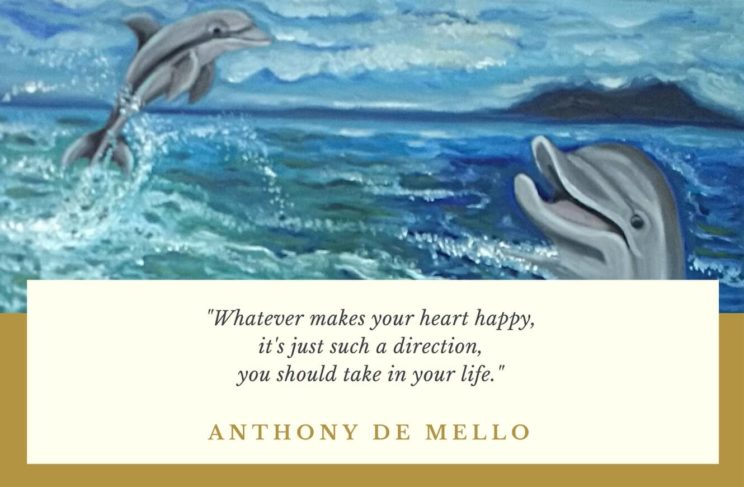How to find your passion?
This is a question that bothers many people and it’s not so easy to find the right answer for that. If you are still looking for it, it may be useful to answer the following questions.
QUESTIONS ON THE HEART LEVEL:
- What would you be doing if you had a 100% guarantee that you would succeed in any field of your choice?
- What would you be doing if you did not have to work for the rest of your life? How would you be spending your time if you did not have to worry about money?
- What would you be doing if you were not afraid? (e.g. of failure, criticism or disapproval of others, e.g. family)
- What did you like to do when you were a child? What was your favorite activity then? What did you dream about then?
- What people come to your mind when you think “What a great life!” about their job, achievements, or the lifestyle they lead? What is the connection between these people? (what elements of work or lifestyle?, for example: traveling, independent profession, helping others, public speaking, giving others joy / making others laugh etc.). This can be a helpful tip on your real needs and driving forces
- If you have children: what talents and skills of your children are important according to you and that is why you take care of creating favorable conditions to develop them, for example through additional classes (music school, drawing, dancing or singing lessons, chess club etc.)
- What do you envy others? What other people’s achievements make you feel regretful, longing, a slight pang of jealousy or anger (perhaps even unconscious, to which you do not want to admit to yourself)? Do you ever happen to discourage others from something you once dreamed about, which you did not succeed in? (even if you think that you act in good faith because you want to spare others disappointment)
- Or maybe the others are trying very hard to discourage you from something, for example by giving arguments that are rational in their opinion (for example: “You can not earn a living doing this”, “I managed to sell only 4 paintings per a year in the last couple of years, and these were works by really talented people … “, ” I tried it a few years ago and I was not able to earn a living”) or by trying to make you feel guilty (e.g.: “I gave up on it. My son is the most important thing in my life and I would not have time for him if I was doing this. Do you have time for your child at all? ” which suggests that if you want to be a good parent, or at least to be perceived in such a way, then you should give it up. In my opinion it is not the best idea, unless you want to show your child how to give up on yourself and your dreams, or how to be an unhappy and frustrated adult. This is not about the amount of time that we spent with our children that makes us good parents, but about its quality. This is not about sharing the same room, but about being together, that matters. Children are great observers, they learn from us, both their beliefs and “how to live”).
The reasons for such a behavior may be different: perhaps they have a fear that someone else will realize something they once dreamed about and they feel discomfort because of that, maybe they want to convince themselves that they once behaved rightly by giving up on their dreams, or they might be simply thinking that they act in good faith, because they judge according to their own experiences: they failed, so others will probably fail (and therefore they want to warn them against it).
Of course, it is always worth taking into account the arguments of others, because, if they are really rational, they can be a hint on what mistakes should be avoided and what aspects should be considered before we start to implement something. However, it should be remembered that other people’s experiences may have different, sometimes very complex causes and it is not said that they will also happen to you. In addition, external conditions are constantly changing, new opportunities appear, and thus also the new ways of acquiring knowledge and realizing our dreams.
The summary:
What comes out of the need of our heart is very important.
Unrealized dreams and needs of our heart often become a source of longing and regret, or even jealousy or anger towards those who are trying or have managed to achieve something that we have never succeeded in.
It also happens that when trying to discourage others from something, in fact we are subconsciously trying to convince ourselves that we have done rightly by giving up on our dreams. We think according to our own experiences. We believe that if we failed, then others will fail too. However, the success of a business is influenced by a number of factors. If we did not succeed, maybe it was not about the inappropriate passion, but about the time or the way of implementation. Perhaps the failure was simply a piece of information that we should change our approach or work harder or more systematically. If this was the case, it is worth analyzing what failed and why – on the level of facts, not emotions.
An important tip is also the talents that we recognize in our children and they seem to us so important that we want to do our best to enable our children to develop them. It can be a sign that this particular passion has been also our dream, and now we do not want to let our child waste this potential. It is worth considering why we care so much about our child’s development of this particular talent or skill.
QUESTIONS ON THE LEVEL OF SKILLS:
- What do you think about yourself?
- What resources do you have? (knowledge, skills, useful character traits, friends)?
- What are you great at? (organizing, team management, negotiations, knowledge transfer, helping others, ability to listen and advice, creativity / aesthetic sense, high resistance to stress, easy establishment of relationships, etc.)
- What of what you are good at, do you really like to do?
- What do you like or you would like to do, but you think you lack the resources? (what needs to be done to gain these resources?)
- What do the others say about you?
- What do other people value in you? (knowledge, skills, personality traits)
- What do other people turn to you for help? (because they think that you are the right person who can help them with this)
The summary:
Knowledge is important, but it can be gained or supplemented when you are determined. Skills can also be developed.
It is worth using mainly those of our resources that bring us joy and benefits to others in the same time.
QUESTIONS ON THE LEVEL OF VALUES:
- What are your values? What is important to you in life? (e.g. independence, freedom, family, health, etc.)
The summary:
Performing activities, professions or hobbies that are in contradiction with our values sooner or later will cause an internal conflict that will not allow us to fully enjoy what we do (e.g. a job/hobby that requires constant travelling and being “away from home”, in the case of a person who values the family life and has a need of constant, close contact with his/her family, can become a source of internal conflict and discomfort, which will not be compensated by any success).
SHOULD A PASSION BE YOUR PROFESSION OR ONLY A HOBBY?
Some say that it should be your profession and lifestyle (because they think that you can be really happy only when you do what you love), whereas the others claim that it should be only a hobby (as they think the passion should be just a springboard from everyday activities, and mixing the passion with work may cause that this passion will not be your passion any more).
In my opinion, the answer to this question is not so unequivocal, because everything depends on additional factors:
- not an every passion can be the source of income, for example, it would be difficult to earn money by collecting the models of trains (whether it’s possible to earn money on your passion or not is a complex problem and a topic for a completely different article)
- not everyone has the personality of a businessman and the so called “business acumen”: if someone does not like taking risks and is afraid of responsibility, or does not want to learn many other things needed to run and develop a business (e.g. accounting basics, legal regulations needed to manage a company at least on a general level, basics of marketing (online & offline) and logistics, social media profiles management, running a website, preparing documents for printing and many other skills necessary to preform activities that you must do yourself at least until you can afford to pay for them) then he/she should realize his/her passion as a hobby (or a full-time job), and not as an entrepreneur. This way he/she will be able to concentrate on what he/she likes to do instead of being frustrated that he/she wastes a lot of time and energy on what he/she does not like or what is the source of stress for him/her. Running your own business is not the best option for everyone.
The summary:
Passion does not have to be our profession or bring us any money. It can be simply realized as a hobby that gives us joy, being a springboard from everyday duties. Even if you do not become a professional guitarist, it’s still worth learning to play the guitar if you have always dreamed about it. It will certainly bring a lot of joy to your life and can become a creative way to spend your free time.
I hope that this article turned out to be at least a bit helpful for you. In the end, I would like to share with you the phrase by Anthony De Mello:

Best regards and have a nice day!
![]()



